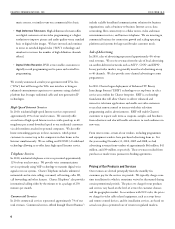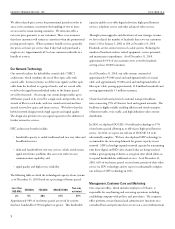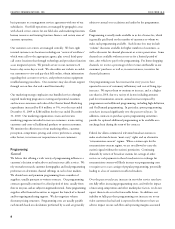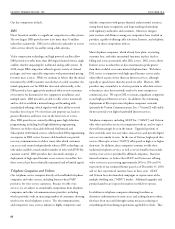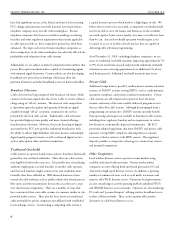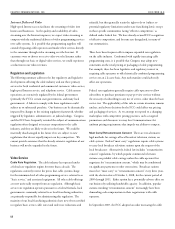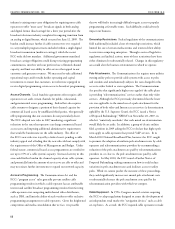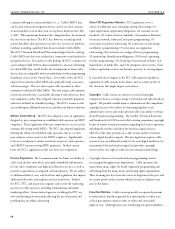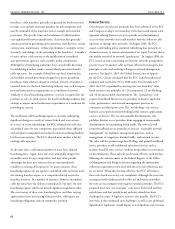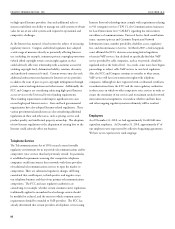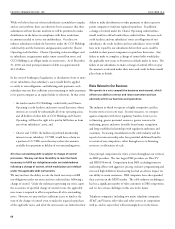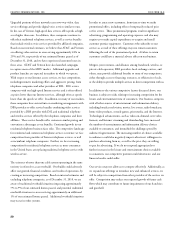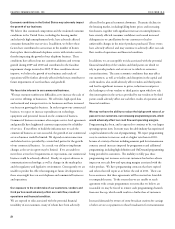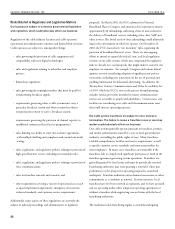Charter 2010 Annual Report Download - page 29
Download and view the complete annual report
Please find page 29 of the 2010 Charter annual report below. You can navigate through the pages in the report by either clicking on the pages listed below, or by using the keyword search tool below to find specific information within the annual report.
on high-speed Internet providers. Any such additional rules or
statutes could limit our ability to manage our cable systems to obtain
value for use of our cable systems and respond to operational and
competitive challenges.
As the Internet has matured, it has become the subject of increasing
regulatory interest. Congress and federal regulators have adopted
a wide range of measures directly or potentially affecting Internet
use, including, for example, consumer privacy, copyright protections
(which afford copyright owners certain rights against us that
could adversely affect our relationship with a customer accused of
violating copyright laws), defamation liability, taxation, obscenity,
and unsolicited commercial e-mail. Content owners may also seek
additional enforcement mechanisms for Internet service providers
to address the issue of peer-to-peer copyright infringement through
private contractual negotiations and other means. Additionally, the
FCC and Congress are considering subjecting high-speed Internet
access services to the Universal Service funding requirements.
ese funding requirements could impose significant new costs
on our high-speed Internet service. State and local governmental
organizations have also adopted Internet-related regulations. ese
various governmental jurisdictions are also considering additional
regulations in these and other areas, such as pricing, service and
product quality, and intellectual property ownership. e adoption
of new Internet regulations or the adaptation of existing laws to the
Internet could adversely affect our business.
e Telecommunications Act of 1996 created a more favorable
regulatory environment for us to provide telecommunications and/or
competitive voice services than had previously existed. In particular,
it established requirements ensuring that competitive telephone
companies could interconnect their networks with those providers
of traditional telecommunications services to open the market to
competition. ere are substantial regulatory changes still being
considered that could impact, in both positive and negative ways,
our telephone business and that of our primary telecommunications
competitors. e FCC and state regulatory authorities are
considering, for example, whether certain common carrier regulations
traditionally applied to incumbent local exchange carriers should
be modified or reduced, and the extent to which common carrier
requirements should be extended to VoIP providers. e FCC has
already determined that certain providers of telephone services using
Internet Protocol technology must comply with requirements relating
to 911 emergency services (“E911”), the Communications Assistance
for Law Enforcement Act (“CALEA”) regarding law enforcement
surveillance of communications, Universal Service fund contribution
issues, customer privacy and Customer Proprietary Network
Information issues, number portability, disability access, regulatory
fees, and discontinuance of service. In March 2007, a federal appeals
court affirmed the FCC’s decision concerning federal regulation
of certain VoIP services, but declined to specifically find that VoIP
service provided by cable companies, such as we provide, should be
regulated only at the federal level. As a result, some states have begun
proceedings to subject cable VoIP services to state level regulation.
Also, the FCC and Congress continue to consider to what extent,
VoIP service will have interconnection rights with telephone
companies. Although we have registered with, or obtained certificates
or authorizations from, the FCC and the state regulatory authorities
in those states in which we offer competitive voice services in order to
ensure the continuity of our services and to maintain needed network
interconnection arrangements, it is unclear whether and how these
and other ongoing regulatory matters ultimately will be resolved.
As of December 31, 2010, we had approximately 16,600 full-time
equivalent employees. At December 31, 2010, approximately 67 of
our employees were represented by collective bargaining agreements.
We have never experienced a work stoppage.


